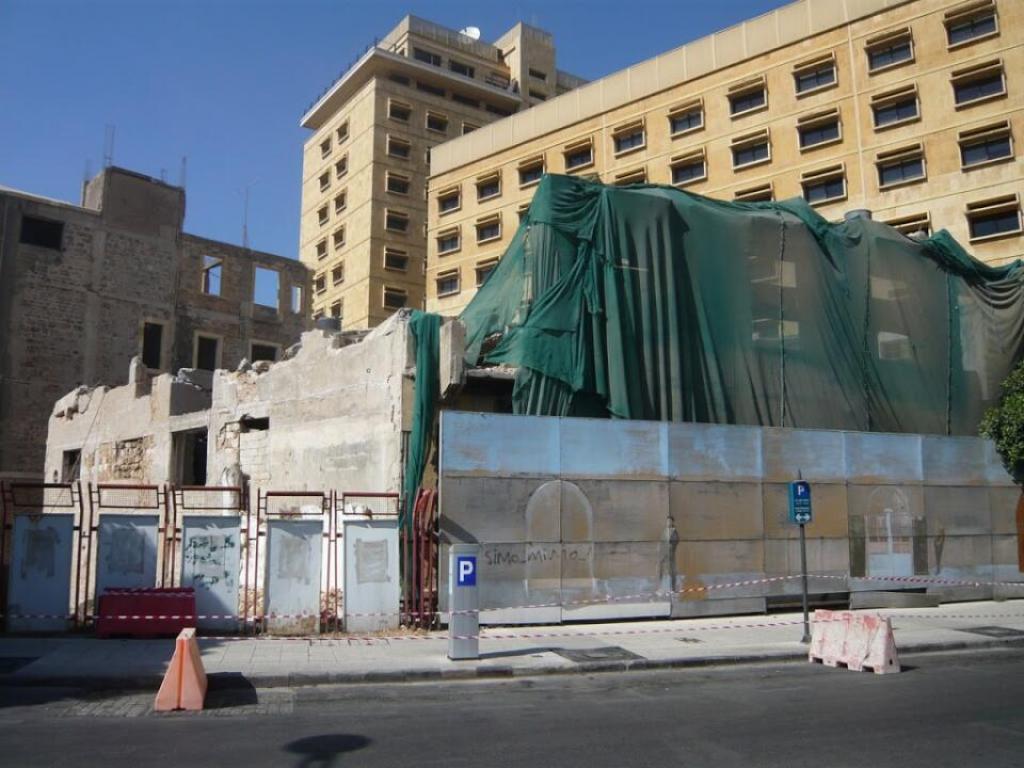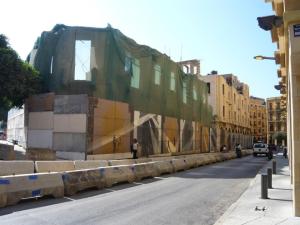
It won’t be long before another historic building vanishes without a trace in Beirut. As one would imagine, there is a heated debate over the redevelopment of the city center, especially because it’s being carried out by a private corporation (Solidere), founded controversially by a former prime minister. What shouldn’t be up for debate however, is photography of historic buildings as they are being destroyed. But as soon as I began snapping shots of said demolition (see photo above), the troubles began.
“Hey you, what are you doing? That’s forbidden” a heavy man exclaimed from a parking lot across the street.
“Hey, what? What’s the problem,” I replied.
“Pictures are forbidden,” he said.
“Why, this is a public street isn’t it,” I asked.
“You are not allowed to take pictures of private property,” he said with certainty, his tone increasingly agitated. “That’s the law.”
I was documenting the destruction of the building, I argued. “Please leave us alone and be on your way,” he replied, adding “you’ve taken your pictures, now go on, leave us.”
He then claimed to represent the building’s owner and insisted I leave the area. When asked who the owner was, he became more anxious. “It’s none of your business who the owner is! Now go on, get out of here! Check the law, bring any police. It’s forbidden” he shouted, getting louder with every word.
“Don’t people have a right to see the history of Beirut before its gone,” I asked.
“KusUm Beirut (Fuck Beirut)” he said, before turning his back to me.
Upon returning to my car a couple of blocks away, I noticed a uniformed police officer standing across the street and decided to get his opinion. “Who told you not to film,” he said, growing anxious himself. “Come with me.”
I led the way and when we arrived the heavy-set parking attendant jumped up and faced the police officer, ready for a fight. “Filming is not allowed here,” he said, raising his voice. “The owner does not allow it.”
“Excuse me habibi, calm down,” the officer said. “Filming of private property is only forbidden if you have a permit. Do you have a permit?”
“No,” the man said, “but it doesn’t matter, it’s forbidden.”
“If you don’t have a permit, he can film from the sidewalk,” the police officer said calmly.
The man began shouting again. He then accused me of infiltrating the building. “He was inside the building!” Suddenly another man appeared, whom I’d never seen before, agreeing with the parking attendant and accusing me of entering the building. “I’m responsible if he is injured (by the demolition). I will be sued!” the attendant said.
“That’s a lie,” I told the officer. “I was taking photos from the street. I never entered the building.”
“I am liar!” the man screamed, throwing his hands in the air. “You are a liar! You’ve come here to cause trouble!”
Naturally, the screaming drew a small crowd and soon a couple of men on scooters and Solidere private security guards showed up and began firing away questions, interrogation style: “Where are you from?”
“Beirut.”
“Where in Beirut,” he added, looking suspicious.
More questions: what do you do, who do you work for, etc.
After a few minutes of back and forth, the men– apparently Solidere undercover police–explained that I could not photograph anywhere, any building in the downtown area without a permit.
The police officer who accompanied me had remained silent the whole time. Then he turned to me: “Listen,” he said, “this is Solidere. Don’t cause problems, just go request a permit.”
“But the building will be gone before I get one,” I countered.
“What can you do,” he said. “They are in control here.”
“But you should be in control,” I told the policeman. “This is the middle of Beirut.” He shrugged his shoulders.
When the officer and I walked back toward my car, we encountered another officer, who had overheard our initial conversation. “What happened,” he asked.
“Turns out Solidere owns the building,” I said.
“Ahhh, Solidereeee,” he said, stretching the name for emphasis. “Don’t even think about taking pictures over there.”
—
Here are some of shots I took before getting “caught”.

It seems to be part of the Grand Theatre complex (adjacent un-destroyed bldg visible above on the same block) which I have written about here. The parking lot attendant/owner representative denied this however, saying “It’s just an old building, where people used to live.”
Yet judging by the architecture, the building seems to be as old as the adjoining Grand Theatre. If anyone has any information on the use of this building or its connection to the Grand Theatre please let me know.
On the subject of the Grand Theatre, I highly recommend Omar Naim’s documentary on it, available here.
During the film, activists argue that the theatre should be preserved as a public space, a point that a Solidere representative seems to agree with during the film. Solidere even had murals painted over the construction walls, showing images that evoked memories of the theatre in its hey day.


Then I noticed this numbering on the blocks, which also seems to indicate some planned restoration work:

But a nearby worker said those plans have been abandoned as have those to create a public theatre space. The Grand Theatre, where legends like Oum Kultoum once sang, will reportedly now be turned into a boutique hotel. Somehow, I imagine the elite guests of said hotel will not appreciate photography either, and yet another part of Beirut’s history will become off limits to the public.
UPDATE:
Solidere Project Manager, Tamara Mae Napper, has promised that the building under demolition will be rebuilt. She said: “Solidere has carried out a detailed survey and even taken moulds of the facade features and salvaged some architectural elements in order to reconstruct it.” Responding to a Facebook thread, she added that the 1930s building was “in a poor state of repair” and “never had any functional or physical connection” to the Grand Theatre, though it seems to have been built around the same time. It is worth noting that the two buildings shared a continuous arched walkway which can be viewed in this picture I took a few years back. The two buildings also shared a common Solidere construction perimeter wall with similar artwork, as seen above.
It remains unclear what function the new building will serve, what, if any, access the public will have to it and to what extent it be “reconstructed”. These basic questions can also be asked about the Grand Theatre. It is also unclear if Solidere will salvage any of the original building materials during its demolition such as the vintage 1930s glass sidewalk, colored glass ceiling and old signage–covered in this post— or the original iron dome with roof opening as seen in Omar Naim’s film.





8 comments
Thanks for this blog/report. If the law says you should not take photographs then you should not. If you have a problem with this then you should go to court and sue the state. That is how people who really want things to change make things change.
Thanks. I wrote about this in the hope of sparking a debate on the legality of policing photography in the downtown area, especially when it comes to historic buildings. Are you voicing an opinion on that?
I’m not sure what you meant by “if i have a problem” as this is not a personal issue, but one being asked by many Lebanese concerned with preservation efforts in the BCD.
As to your suggestion on raising the issue in the courts, have you lived in Lebanon? The justice system here (if you can call it that) is heavily politicized, understaffed and overburdened with a massive back log. If you have any suggestions on approaching this, I would be happy to hear them.
Habib, I hope you are not standing int he way of progress. And why is it you seem to have a serious problem with Solidere when it was Solidere, a PUBLICLY TRADED COMPANY,brought back the downtown area from the abyss. Solidere built the roads that you stood on to take your pictures and the restaurants where you regularly have your lunch and beer.
The Prime Minister you mentioned does not even own 0.5% of the company’s shares yet he is always being accused of harming downtown Beirut, which is — on its own – responsible for generating of over $1 billion of tourism revenues for the country.
I agree that Solidere is not the most transparent public company in the country, but then what company is?
Your attention should be pointed towards the incredible source of corruption that we call the Lebanese government. You should instead take pictures of ministers receiving kickbacks on everything from infrastructure contracts to harboring and protecting murders and thieves. NOW this will be a more interesting and real topic worth debating.
I’ve been through this and i admire your courage and perseverance. I ounce tried to enter St Vincent church in Downtown to take some photos and the security guy first asked me nicely to leave because he’s concerned on my safety then i asked him if i can just take photos from outside he said it’s also forbidden for the same bla bla shit they told you private property, solidere, blablabla…
Thank you Jocelyne, appreciated hearing your story, it has happened to so many of us.
As to Muscatine and Mowaten Libnani, both profiles appear to have been created for the purpose of this site only, not to engage in a discussion, but mainly to voice a point of view, or reject the post entirely.
This underscores one difficulty of practicing journalism in Lebanon: When investigating a subject, one can easily be accused of pursing a hidden agenda associated with the subject’s political enemies. Thus party loyalists are always ready for a fight, no matter what the evidence or points raised. Having said that, two questionable figures have been presented by Mawatan Libnani– can these be referenced?
The topic of Solidere’s shareholders, its shareholding schemes and its relationship with the state is a long and complicated story. For those interested in learning more I would suggest the research of Saree Makdisi and Richard Becherer as a starting point.
Two years ago I visited Beirut and I found the same problem with taking pictures of the renewed synagogue…
Too bad! But I also wonder if anybody is taking care of documenting old Beirut before it disappears? This should be the legitimate work of Beirutis and anybody interested in the city. Hamra is going through the same problem, with historic buildings being thorn apart from one day to the next, cancelling memories from people’s lives. Why not engage in a bipartisan documentation of present day Beirut, before it changes, to pass on memories to the next generations? Is that too “political”?
Just came across your blog and read this and your post about the Grand Theatre. What you are doing is very bold, please keep it up. Solidere and the other political and financial powers in Lebanon want to rob the Lebanese from their history, architectural heritage, and eventually identity. All this to open hotels and shops that most Lebanese people can’t afford.
This might be of interest
URBAN HERITAGE AND ITS POLITICS :THE GRAND THEATER in Beirut
http://spatiallyjustenvironmentsbeirut.blogspot.com/2011/08/image-by-caroline-tabet-of-theater-of.html